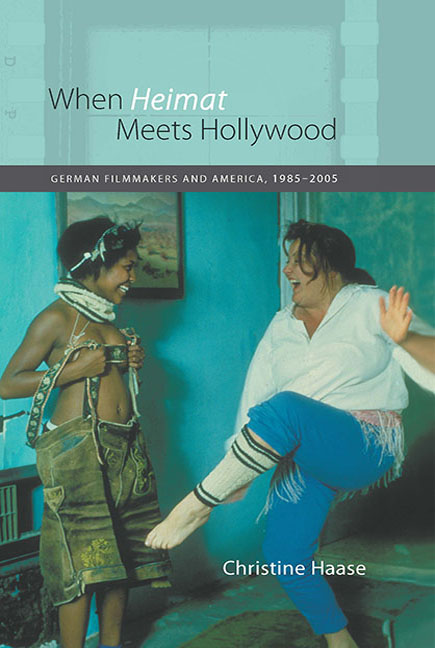Book contents
- Frontmatter
- Dedication
- Contents
- Acknowledgments
- Introduction
- 1 German and American Film Relations in the Twentieth Century
- 2 Wolfgang Petersen: Blockbuster Auteur?
- 3 “Foil, Toothpaste, ID4”: Ideology and Global Appeal in the Films of Roland Emmerich
- 4 Crossing Boundaries, Connecting People: The German-American Films of Percy Adlon
- 5 “Bambi, Zombie, Gandhi”: The Cinema of Tom Tykwer
- Conclusion
- Works Cited
- Index
4 - Crossing Boundaries, Connecting People: The German-American Films of Percy Adlon
Published online by Cambridge University Press: 11 May 2017
- Frontmatter
- Dedication
- Contents
- Acknowledgments
- Introduction
- 1 German and American Film Relations in the Twentieth Century
- 2 Wolfgang Petersen: Blockbuster Auteur?
- 3 “Foil, Toothpaste, ID4”: Ideology and Global Appeal in the Films of Roland Emmerich
- 4 Crossing Boundaries, Connecting People: The German-American Films of Percy Adlon
- 5 “Bambi, Zombie, Gandhi”: The Cinema of Tom Tykwer
- Conclusion
- Works Cited
- Index
Summary
Of the directors discussed in this study, Percy Adlon is the one most closely associated with independent and less profit-oriented filmmaking. Yet, despite his rather prolific career and the critical recognition of his often intriguing and innovative approaches to filmmaking, the director has not received much scholarly attention. This may be due to the fact that Adlon's feature films tend to fall through paradigmatic and national cracks, as many of them are German-American hybrids. Therefore, they do not easily fit into either national mode of film criticism and scholarship.
Adlon's works are diametrically opposed to those of Roland Emmerich, yet, the two directors share not only Southern German roots, but also a common goal of reaching audiences beyond their own national borders. However, in terms of accomplishing this goal, that is, with respect to mode of production and representation as well as economic strategies and ideological project, the filmmakers have little in common. This chapter will examine Adlon's transnational cinematic approaches traceable in his German-American films and investigate the “double-voiced discourse” the director's U.S.-based productions aim to create. The analysis will focus on three significant art films Adlon made within four years of each other — Out of Rosenheim (Bagdad Café, 1987), Rosalie Goes Shopping (1990), and Salmonberries (1991) — that provide representative examples for his distinct mode of transnationalizing film. While special emphasis will be placed on Out of Rosenheim, the filmmaker's most successful production to date both critically and commercially, each of the films illustrates the authorial markers that characterize Adlon's dual-voiced approach. All three productions traverse national-cultural paradigms in an effort to be transnationally intelligible and appealing. Taken together, they illustrate Adlon's highly idiosyncratic approach to filmmaking distinct from Hollywood conventions. In constructing his cinematic version of the United States and juxtaposing it with its German (and European) Other, Adlon often works with a set of Hollywood-inspired tropes and clichéd notions of “Americanness” that seem rooted in German perceptions — which is similar in some ways to how Emmerich works. However, in stark contrast to Emmerich's films, Adlon's productions are ideologically open-minded and informed by a socially and politically progressive agenda.
- Type
- Chapter
- Information
- When Heimat Meets HollywoodGerman Filmmakers and America, 1985–2005, pp. 134 - 161Publisher: Boydell & BrewerPrint publication year: 2007



